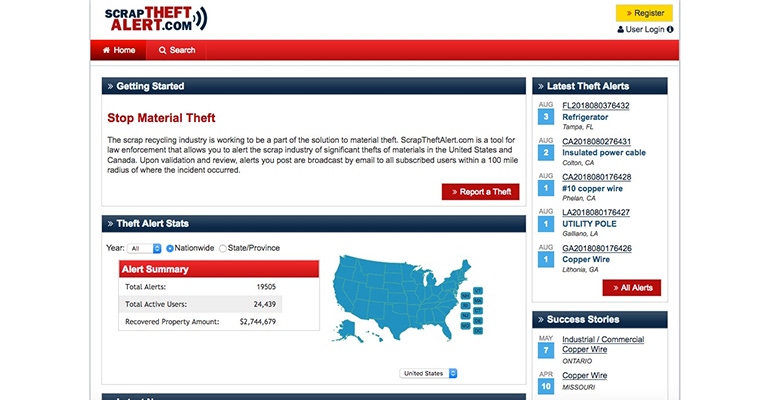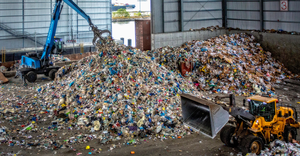ISRI’s Scrap Theft Online Tool Reaches 10,000 Users
The tool helps law enforcement across the country recover stolen scrap metal. It is also available to recyclers and property owners.

Since 2008, the Institute of Scrap Recycling Industries Inc. (ISRI) has provided law enforcement across the country with ScrapTheftAlert.com, an online tool to aid in the recovery of stolen scrap metal. This web-based theft alert system is available at no cost to law enforcement, recyclers and property owners.
The system recently celebrated more than 10,000 registered law enforcement users, which constitutes approximately 21 percent of law enforcement agencies in the U.S.
“[This milestone] signifies the acceptance of the system as being a viable tool in the fight against metals theft,” says Brady Mills, director of law enforcement outreach for ISRI, based in Washington, D.C. “It is important that both recyclers and law enforcement work together, and this system is one tool that allows them to do so.”
In the last 10 years, there have been more than 19,000 alerts issued, and the system has helped recover more than $2.7 million in property. In addition to the alerts, ScrapTheftAlert.com also is used by law enforcement as an intelligence gathering tool. Officials can see what and where materials are being targeted in surrounding areas to look for trends.
“ISRI and its members desired to work with law enforcement and be proactive in the fight against metals theft,” says Mills. “ISRI continues to work to be part of the solution to combat metals theft.”
ScrapTheftAlert.com broadcasts alerts to scrap facilities to be aware of recently stolen material. It allows registered users to send alerts out to a 100-mile radius of a theft. The radius can be expanded when warranted.
“Users can go to ScrapTheftAlert.com and register free of charge,” says Mills. “Users can then post alerts regarding stolen material by providing descriptive information of the material, photos if available, suspect and suspect vehicle information if available. Users also will receive alerts that are posted with their 100-mile radius. The radius location is determined by the ZIP Code of the theft location.”
Recyclers receiving alerts can have their scale operators and intake personnel watch for stolen material posted on the alert. Law enforcement contact information is required on the alert.
“[The tool] allows law enforcement to be proactive in the search for stolen material. Material can be identified and recovered before being processed by the recycler,” says Mills. “The system also alerts law enforcement receiving alerts within their area to be aware of what is being stolen in neighboring communities. For example, if backup batteries are being stolen from an electric utility substation in a neighboring community, officers might keep a closer watch in their own community.”
Overall, there more than 24,000 total registered users, including private security, companies and individual users in addition to law enforcement.
Jennifer Morrison, chief of police for the Colchester Police Department in Colchester, Vt., says her jurisdiction has been using ScrapTheftAlert.com for about two years.
“Our jurisdiction does not handle many scrap metal cases, so when we do get one, it is like starting from scratch each time,” she says. “When I became aware of this resource, I introduced it to our detectives who also felt this would be a great resource in scrap metal cases.”
Morrison says she is hoping surrounding agencies and recyclers will join so that they can coordinate their efforts across the region.
“There are not many places where someone can convert scrap metal to cash in Vermont, and it would be extremely beneficial to have ScrapTheftAlert.com be a common repository for information across this small, rural state,” she says. “In fact, it would be great if recyclers were mandated to participate.”
About the Author(s)
You May Also Like


